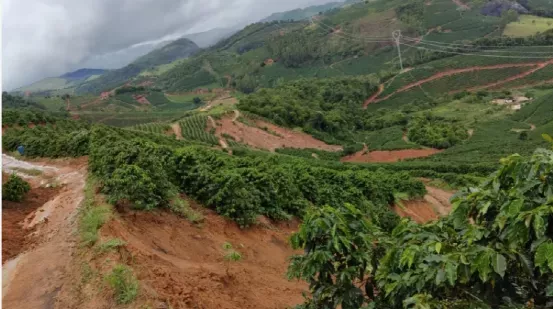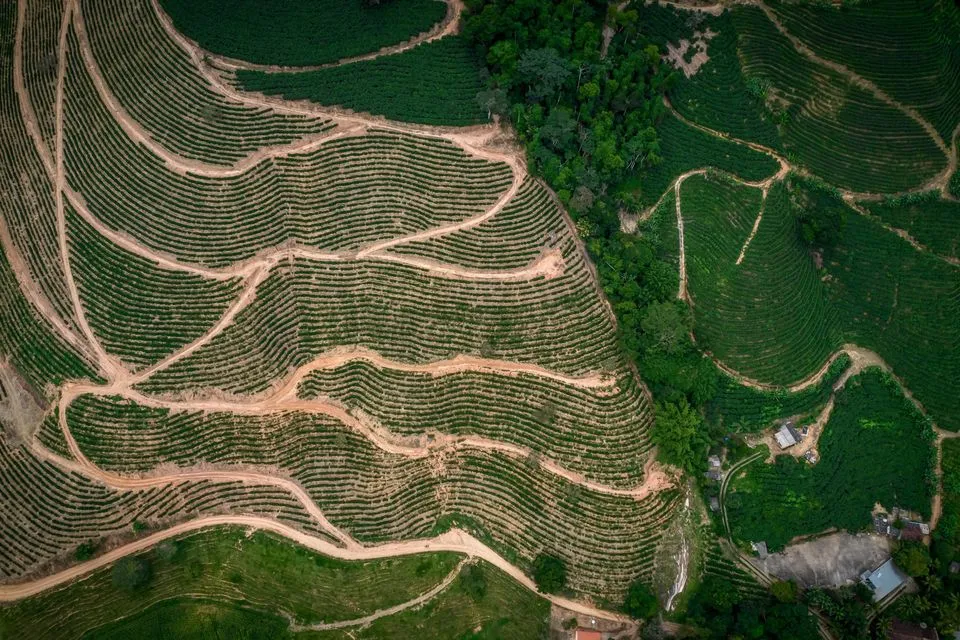The latest Arabica coffee bean price how much is the Brazilian coffee bean Yunnan small coffee bean in 2022?
The situation of Brazilian coffee producing areas last year is obvious to all, coupled with the small year of Brazilian coffee production, Brazilian coffee production last year is not optimistic. With the arrival of spring in the southern hemisphere, coffee producing areas also ushered in a delightful Rain Water, flowering to a certain extent to ease the anxiety of many parties. However, after the joy was revealed, the coffee flowers withered, unexpectedly no result! This not only affects the production of Brazilian coffee beans, but also affects the futures price of Arabica coffee beans.
Since the beginning of December last year, coffee producing areas in Brazil have also been "full of disasters".... After days of heavy rainfall and flood, the soil can not resist the overflow of the river after absorbing a large amount of water, which greatly increases the risk of landslides. And days of heavy rain have also affected the state of Minas Gerais, Brazil's largest coffee producing region.

The year 2022 is a big year for the production cycle of Brazilian Arabica coffee, which means that Brazilian coffee production has greater potential this year. However, because the frost in July last year damaged the coffee trees, the drought in September delayed flowering. Coffee growers in Minas Gerais still have negative expectations for coffee production in 2022.
The head of a local coffee technical support and promotion company said: it is also a big year of production, and the flowering rate of coffee trees this year is only 50% of that of 2020, so the fruit rate will be greatly reduced. However, as it is a big year of production, Brazil's production this year will be higher than in previous years.
Volcafe, the world's largest coffee trader, is also pessimistic, with Brazil's Arabica production expected to decline by 17% due to a shortage of potential coffee crops in 2022. Coffee consumption grew by only 1% from 2021 to 2022. In order to meet the demand for coffee, the market will replace Arabica coffee beans with robusta beans, which are cheaper and have a worse flavor.
Of course, it's not all bad news! Brazilian authorities issued a more optimistic message on Tuesday, saying that Brazilian coffee production in 2022 is expected to rise 16.8% from the previous year, 55.74 million bags of coffee (60kg/ bags), although still lower than market expectations. This figure is significantly less than the 63 million bags of coffee produced in Brazil in 2020.
Lower-than-average harvests could lead to inventory deficits or even supply shortages, which would keep coffee futures prices near 10-year highs.
In an article published by the Wall Street Journal on January 21, US time, one of the coffee growers interviewed several Brazilian coffee growers. One of the coffee growers said in an interview that the amount spent on fertilizer this year was three times that of last year, and that it was even necessary to register a reservation before the supplier could deliver the goods. Due to the shortage of fertilizers, the growth and development of coffee beans will also be affected, and the quality of coffee beans in 2022 and 2023 is expected to be lower than before. Some growers also have no choice but to reduce the acreage by half or more because of the high planting costs.

Repeated outbreaks have led to material shortages, coupled with the emergence of various extreme weather, making the yields of many crops bleak. In the end, it is not only the upstream producers but also the end consumers who suffer.
Brazil is the largest coffee producer in the world, and it is also used as the standard of global coffee price in the world commodity coffee trade, and the coffee price in Yunnan is no exception. For the same reason, the price of coffee in Yunnan rose to 40 yuan / kg from 2010 to 2011, and fell back to 12-15 yuan / kg the next year. Since then, the price of coffee beans in Yunnan has never returned to this price. In the past year, even if the world coffee bean price skyrocketed, there is still some gap compared with that year, but its impact on Yunnan coffee beans deserves the attention of the industry.
Important Notice :
前街咖啡 FrontStreet Coffee has moved to new addredd:
FrontStreet Coffee Address: 315,Donghua East Road,GuangZhou
Tel:020 38364473
- Prev

Is it easy to open a coffee shop? The coffee shop owner complained that the guests were in trouble and ran away!
In addition to drinking coffee, "taking pictures, clocking in, and posting moments" has become a "signature action" for many girls to go to coffee shops. Find a little sister / make an appointment with a boyfriend, go to the coffee shop and order a cup of coffee and pat it crazily. Two hours later, there is no sip of coffee. "Today's coffee is written on moments."
- Next

Coffee bean trees can also be grown in Japan! The first batch of Japanese-made coffee beans came out!
Growing coffee locally has been something that generations of Japanese have been pursuing. Due to topography, climate and other reasons, Japan's local natural environment is not suitable for growing coffee. In winter, because it is too cold, it is difficult for coffee trees to survive. Even if they do, they will not be able to blossom and bear fruit.
Related
- What grade does Jamaica Blue Mountain No. 1 coffee belong to and how to drink it better? What is the highest grade of Blue Mountain coffee for coffee aristocrats?
- What are the flavor characteristics of the world-famous coffee Blue Mountain No. 1 Golden Mantelin? What are the characteristics of deep-roasted bitter coffee?
- Can I make coffee a second time in an Italian hand-brewed mocha pot? Why can't coffee be brewed several times like tea leaves?
- Hand-brewed coffee flows with a knife and a tornado. How to brew it? What is the proportion of grinding water and water temperature divided into?
- What is the difference between Indonesian Sumatra Mantinin coffee and gold Mantinin? How to distinguish between real and fake golden Mantelin coffee?
- What does bypass mean in coffee? Why can hand-brewed coffee and water make it better?
- Unexpected! Ruixing Telunsu lattes use a smoothie machine to foam milk?!
- % Arabia's first store in Henan opens into the village?! Netizen: Thought it was P's
- Does an authentic standard mocha coffee recipe use chocolate sauce or powder? Mocha Latte/Dirty Coffee/Salty Mocha Coffee Recipe Share!
- What is the difference between Vietnam egg coffee and Norway egg coffee? Hand-brewed single product coffee filter paper filter cloth filter flat solution!

